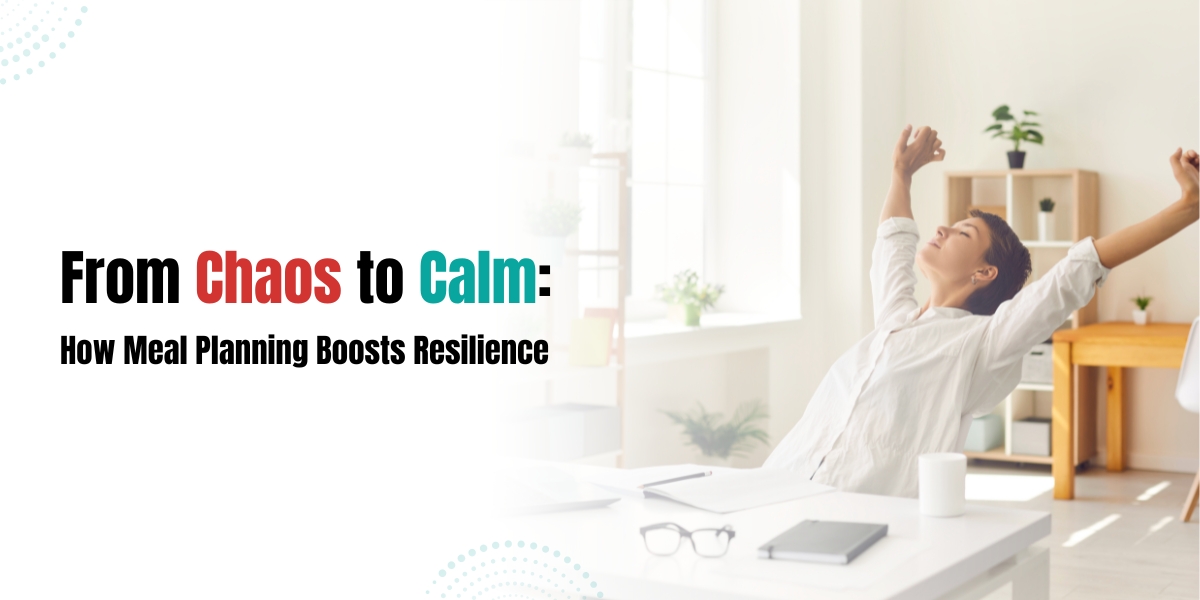
From Chaos to Calm: How Meal Planning Boosts Resilience
Nutritionally Resilient
Before getting into meal-planning specifics, it's important first to discuss the relationship between nutrition and resilience. Our bodies and minds are complicatedly intertwined, and nutrition interacts with our mental and physical health. If the levels of cortisol hormone in the body remain raised over time, they can have harmful effects.
Sustained high levels of cortisol can lead to anxiety, depression, digestion problems, and weaker immunity.
The Stress of Bad Eating
Most people eat unhealthy food, some due to hectic schedules, stress, or even nutritional ignorance. This mainly results in chaotic eating patterns—skipping meals, relying on fast food, and making last-minute, unhealthy choices. These habits not only deprive the body of essential nutrients needed daily but also contribute to anxiety, fatigue, and irritation.
When life gets crazy, meal planning is the first casualty. People reach for convenience foods filled with sugar, unhealthy fats, and empty calories. Such a chaotic way of eating wears on both body and mind, ultimately making it harder to deal with stress and maintain an optimistic outlook.
Meal Planning for Resilience
- Nutritional Consistency: Meal planning ensures that you have a well-balanced meal with the right proportion of macronutrients—proteins, fats, and carbohydrates—and micronutrients—vitamins and minerals—during every meal. This will help in maintaining stable energy levels andsharpened cognitive functioning for overall well-being.
- Less stress: Knowing ahead of time what you are going to eat takes away the daily stress of worrying about this decision so that you can go on about your busy or overwhelming days. This can free up some mental space and reduce decision fatigue for other stuff.
- Time Management: Meal planning allows one to use one's time efficiently. Chop ingredients or cook whole meals in advance so that you will save some time during the week and hence reduce the urge to order some takeout or fast food, which is less healthy.
- Better Mood and Energy: Meal planning helps to balance the diet so that the levels of sugar in the blood remain stable, preventing the development of mood swings and energy crashes. Stable levels are important in maintaining a positive mindset, and thus, one needs to have the stamina to overcome the challenges of daily life.
- Mindful eating: By planning a meal, a person notes the actual nutrition in the meal. Thus, one will be more likely to make good food choices, eat moderate portions, and be more mindful when eating.
How to Get Started with Meal Planning?
The steps below help one to get started.
- Set your goals
- Choose Your Recipes
- Make a Grocery List
- Prep Ahead
- Keep Flexible
Meal Planning as a Tool for Calm and Control
Meal planning is an exceedingly simple yet powerful solution to the chaos of poor eating. Meal planning in advance requires time and allows one to gain mastery over nutrition while creating a sense of order in life. Ingredients of this process can help lessen the need for impulsive, less-than-healthy choices.
Role of Nutrition in Building Resilience
Meal planning is much more than a practical tool for eating well. Instead, it's a strategy to build strength in hard times. By controlling what you eat, you can build a foundation of physical and mental strength, better equipping you for the trials and tribulations that life throws your way.
Conclusion
Meal planning is just that—one of life's skills that will proactively help you keep your stress levels under control, boost your immune system, and keep you calm during times of adversity.
As you build this habit, no doubt, you will find the effects of this practice permeating not only the kitchen but also extending to other aspects of your life. From chaos to calm, integrating meal planning with a Resiliency Program is a powerful way to boost your resilience and create an overall enhanced quality of life.